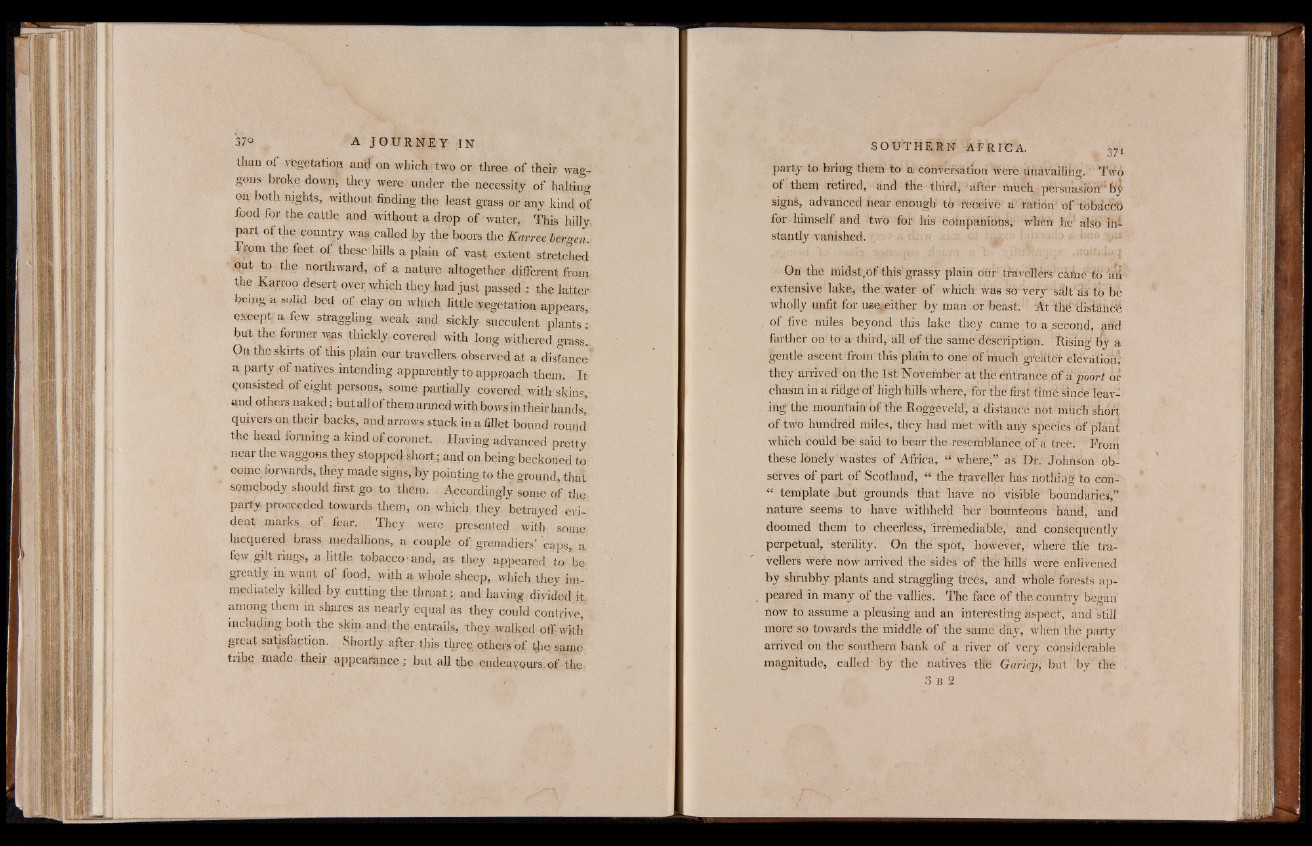
than of vegetation and on which two or three of their waggons
broke down, they were under the necessity of halting
on both nights, without finding the least grass or any kind of
food for the cattle and without a drop of water, This hilly
part of the country was called fiy the boors the Karree ber^en.
From the feet of these hills a plain of vast extent stretched
out to the northward, of a nature altogether different from
the Karroo desert over which they had just passed ; the latter
heing a solid bed of clay on which little vegetation appears,
except a few straggling weak and sickly succulent plants;
but the former was thickly covered with long withered grass.,
On the skirts of this plain our travellers observed at a distance'
a party of natives intending apparently to approach them. It
consisted of eight persons, some partially covered with skins,
and others naked; but all of them armed with bows in their hands,
quivers on their backs, and; arrows stuck in a fillet bound , round
the head forming a kind of coronet. Having advanced pretty
near the waggons they stopped short; and on being beckoned to
come forwards, they made signs, by pointing to the ground, that
somebody should first go to them. Accordingly some of the
party proceeded towards them, on which they betrayed evident
marks of fear. They were presented with some
lacquered brass medallions, a couple of grenadiers’ caps, a
few gilt rings, a little tobacco • and, as- they. appeared to be
greatly in want of food, with a whole sheep, which, they immediately
killed by cutting the throat; and having divided it
among them in shares as nearly equal as they could contrive,
including both the skin and, the entrails, they walked off with
great satisfaction. Shortly after this three others of tjie s,ame
tribe made, their appearance; but all the endeavours.of the
party to bring them to a conversation Were ünâVailihg. ' Two
of them retired, and the third, ’after much persuasion fry
signs, advanced hear enough tó receive a ration' of tobdcèü
for himself and two for his companions; when he; alsb tiff
stantly vanished.
On the midst,of this grassy plain our travHlérs cááiC fô aii
extensive lake* - th é .water of which was so very sáltás to be
wholly unfit for use*either by man or beast. At th'é ttisiánce
of five miles beyond this lake they came to a second, and
farther on to'a third, all of the saine description. Rising By a
gentle ascent from this plain to one df much giffâtér elevation;
they arrived on the 1st November at the entrance of a poort or
chasm in a ridge of high hills where, for the first timé Since leaving
the mountain of the Roggéveld, a distance not much short
of two hundred miles, they had met with any speéîes Of plani
which could be said to bear the resemblance, of a tree. Troni
these lonely wastes of Africa, “ where,” as Dr. Johnson observes
of part of Scotland, “ the traveller has nothing to con-
“ template .but grounds that have no visible boundaries,”
nature seems to have withheld her bounteous hand, and
doomed them to cheerless, irrémédiable, and consequently
perpetual, sterility. On the spot, however, where the travellers
were now arrived the sides of thè hills were enlivened
by shrubby plants and straggling trees, and whole forests appeared
in many of the vallies. The face of the country began
now to assume a pleasing and an interesting aspect, And “still
more so towards the middle of the same day, when the party
arrived on the southern bank of a river of very considerable
magnitude, called by the natives thé Gariep, but by the
3 B g